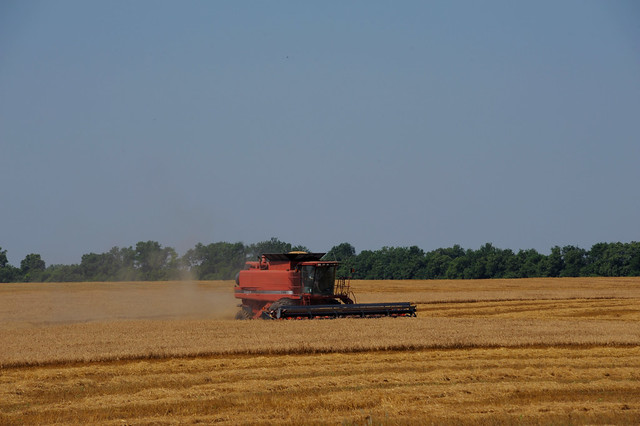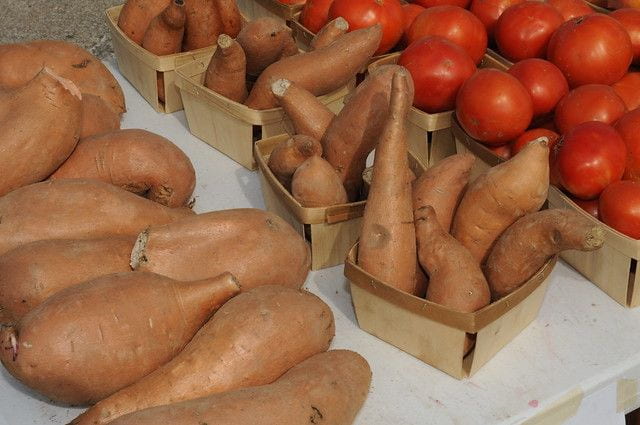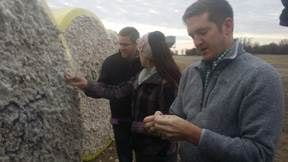**ALERT: If you’ve signed up to subscribe to Better Kansas by email, make sure ksrenews@ksu.edu is added to your safe sender list.
Welcome to Better Kansas. Every week we shed light on events, resources and other information designed to make your life, your businesses, your communities and state better. For many more resources and activities, check with the K-State Research and Extension office in your area. Watch for Better Kansas on Thursdays. In the meantime, check blogs.k-state.edu/ksrenews to sign up for a weekly email and for archived entries. – Mary Lou Peter mlpeter@ksu.edu
Better Living, Better Communities
 NOT LONG AGO WE WERE ENCOURAGED TO HAVE THREE MONTHS’ WORTH of living expenses in a savings account, in case something big happens — job loss, major car repairs, the furnace finally giving out or other emergency. Somewhere along the way that guideline went to six to 12 months, partially reflecting changes in the average length of unemployment between jobs. In 1985, the average time someone was between jobs was 15 weeks, or about four months. In 2015, the average was about 29 weeks, or seven months. We all have plenty of places for that paycheck to go once it lands in our bank account – rent or mortgage payments, groceries, utility bills, car payments – and surely we can go to a movie or have a weekend getaway, right? The factsheet Spend Some, Save Some, Share Some: Family Budgeting covers patterns of major household expenditures, housing, saving and giving, plus guidelines for developing a spending plan. Many local extension offices around the state offer programs and resources on personal financial planning. Check with yours about what’s offered and when.
NOT LONG AGO WE WERE ENCOURAGED TO HAVE THREE MONTHS’ WORTH of living expenses in a savings account, in case something big happens — job loss, major car repairs, the furnace finally giving out or other emergency. Somewhere along the way that guideline went to six to 12 months, partially reflecting changes in the average length of unemployment between jobs. In 1985, the average time someone was between jobs was 15 weeks, or about four months. In 2015, the average was about 29 weeks, or seven months. We all have plenty of places for that paycheck to go once it lands in our bank account – rent or mortgage payments, groceries, utility bills, car payments – and surely we can go to a movie or have a weekend getaway, right? The factsheet Spend Some, Save Some, Share Some: Family Budgeting covers patterns of major household expenditures, housing, saving and giving, plus guidelines for developing a spending plan. Many local extension offices around the state offer programs and resources on personal financial planning. Check with yours about what’s offered and when.
 What the heck is a Traditional IRA? How’s it different from a Roth IRA? We hear these terms tossed about but really, what do they mean? It’s easy to get caught in the throes of early career activities or starting a family, but that’s the time to get educated about funding your retirement. Easier said than done, I know, but it’s never too late to learn. The Individual Retirement Accounts factsheet provides the basics, complete with easy-to-understand examples. Contributions to Traditional IRAs can be either tax deductible or nondeductible. Contributions to Roth IRAs are not tax deductible but the earnings from a Roth IRA are tax-free. Contributions we make to custodial accounts at financial institutions, insurance companies or investment brokerage firms may be moved from one custodian or trustee to another and because there is no distribution (to you), the transfer is tax free. However, the custodian may assess a fee or penalty for the transfer. Once you’ve checked out the basics of the first factsheet, take a look at Shopping for an Individual Retirement Account. All good to know … wish I’d had these resources a long time ago.
What the heck is a Traditional IRA? How’s it different from a Roth IRA? We hear these terms tossed about but really, what do they mean? It’s easy to get caught in the throes of early career activities or starting a family, but that’s the time to get educated about funding your retirement. Easier said than done, I know, but it’s never too late to learn. The Individual Retirement Accounts factsheet provides the basics, complete with easy-to-understand examples. Contributions to Traditional IRAs can be either tax deductible or nondeductible. Contributions to Roth IRAs are not tax deductible but the earnings from a Roth IRA are tax-free. Contributions we make to custodial accounts at financial institutions, insurance companies or investment brokerage firms may be moved from one custodian or trustee to another and because there is no distribution (to you), the transfer is tax free. However, the custodian may assess a fee or penalty for the transfer. Once you’ve checked out the basics of the first factsheet, take a look at Shopping for an Individual Retirement Account. All good to know … wish I’d had these resources a long time ago.
RECENT FLOODING, TORNADOES AND OTHER DISASTERS are traumatic, especially for children, who very possibly will experience them in a different way than you or I would. They don’t see events in the same context that adults do. Symptoms such as sleeplessness, sadness, a decline in school performance and even depression can take hold after children go through a traumatic event. I’m reminded of something a friend said years ago, just after 9-11 when many of us were glued to our televisions. Her young son had seen repeated video footage of a plane flying into the World Trade Center in New York City. He knew his mom often traveled for work, and expressed fear for her to fly again. Behaviors to watch for and suggestions on how to talk to children about disasters are included in Disasters: Children’s Responses and Helping Them Recover.
Better Farming, Ranching and Gardening
ARC, PLC, SCO, CBV, CAT …. it’s not always easy to sort through USDA acronyms. And just as new legislation always does, the passage of the most recent Farm Bill is bringing changes to agricultural producers across the land linked to programs associated with some of those acronyms. With those changes come new decisions farmers will need to make. What are the economic impacts to consider when making decisions this year and in coming years? To help shed light on some of the most important implications, K-State Research and Extension is hosting 10 Farm Bill Meetings in locations across Kansas, starting Monday, Aug. 26. Speakers include agricultural economists, USDA Farm Service Agency and Natural Resources Conservation Service officials providing a broad perspective and extension agents taking a more local view in each location. Topics will include commodity programs, changes in crop insurance, the economics of the Agriculture Risk Coverage/Price Loss Coverage (ARC/PLC) programs and a look at a decision tool developed by Oklahoma State and K-State that producers can use.
Just don’t get me started on the acronyms. Fortunately, there’s a USDA Glossary to help people like me.
AS I WRITE THIS, MUCH OF THE STATE IS HAVING A REPRIEVE from a string of really hot days. They’ll be back. It’s Kansas, after all. Extreme heat or for that matter, extreme temperatures either way affect not only us, but also our animals. Cattle can’t dissipate heat as well as some animals and high temperatures and humidity can limit appetite and reduce average rates of gain. In worse case scenarios, animals die. Heat stress is especially hard on heavy and dark-hided cattle and those with a poor immune system. To help monitor animals’ needs during normal and extreme weather, Kansas Mesonet developed the Cattle Comfort Index. In addition, listen to a recent Agriculture Today radio segment or read more about reducing heat stress in cattle.
 WATERMELON, CANTALOUPE AND HONEYDEW, OH MY! If you’re growing any or all, it can be a challenge to know when they’re ripe enough to harvest, or for that matter, if they’re ripe enough to buy for your family gathering tonight. According to the July 16, 2019 Horticulture Newsletter, muskmelons especially, tell you when they’re ready for harvest. As a melon ripens, a layer of cells around the stem softens so the melon detaches easily from the vine – a process called “slipping” — and leaves a dish-shaped scar at the point of stem attachment. Watermelons are more challenging, but look for the tendril that attaches at the same point as the melon to dry and turn brown. Ripe watermelons also normally develop a yellow color on the “ground spot” – the area where the melon was in contact with the ground – when they’re ripe. For more information check out all of the weekly Horticulture Newsletters or contact your local extension office. I can say from personal experience, if you leave whole Halloween pumpkins behind your house and forget about them, they sometimes turn into volunteer pumpkins for next year. More on that another time.
WATERMELON, CANTALOUPE AND HONEYDEW, OH MY! If you’re growing any or all, it can be a challenge to know when they’re ripe enough to harvest, or for that matter, if they’re ripe enough to buy for your family gathering tonight. According to the July 16, 2019 Horticulture Newsletter, muskmelons especially, tell you when they’re ready for harvest. As a melon ripens, a layer of cells around the stem softens so the melon detaches easily from the vine – a process called “slipping” — and leaves a dish-shaped scar at the point of stem attachment. Watermelons are more challenging, but look for the tendril that attaches at the same point as the melon to dry and turn brown. Ripe watermelons also normally develop a yellow color on the “ground spot” – the area where the melon was in contact with the ground – when they’re ripe. For more information check out all of the weekly Horticulture Newsletters or contact your local extension office. I can say from personal experience, if you leave whole Halloween pumpkins behind your house and forget about them, they sometimes turn into volunteer pumpkins for next year. More on that another time.













